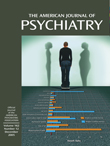Hypertension and Aripiprazole
To the Editor: Aripiprazole is a second-generation antipsychotic approved for the treatment of schizophrenia and increasingly used in bipolar patients. It acts as a partial agonist at dopamine receptors and displays high affinity for serotonin 5-HT1A and 5-HT2A receptors on 5-HT neurons, producing partial agonism and antagonism, respectively. Its side effects include insomnia, anxiety, headaches, nausea, vomiting, and somnolence (1). Aripiprazole’s affinity for α1-adrenergic and muscarinic receptors is low; consequently, cardiovascular adverse effects are rare. Only postural hypotension (without clinical symptoms) has been described in elderly patients (2). However, we report a case of hypertensive crisis triggered by aripiprazole.
Ms. A, a 56-year-old postmenopausal patient with a 30-year history of paranoid schizophrenia, was admitted to the hospital for an acute exacerbation of her mental disorder. Upon admission, bizarre paranoid delusions and auditory hallucinations were present. A medical history and a physical examination revealed no somatic disorder. Aripiprazole was then initiated at 15 mg/day. Twenty-six hours after her first dose—30 mg—she complained of palpitations. The findings of a physical examination were tachycardia (120 bpm, regular) and arterial hypertension (220/110 mm Hg). Her neurological state was normal. Aripiprazole treatment was interrupted, and Ms. A’s blood pressure returned progressively to its usual range (130/90 mm Hg) over 72 hours without treatment. Aripiprazole was then started again at 15 mg/day. Symptoms (palpitations) and signs (a heart rate of 120 bpm and blood pressure of 220/110 mm Hg) recurred over a few hours. Ms. A was successfully treated with propanolol, and aripiprazole was stopped. A first-generation antipsychotic was introduced, and both somatic and psychiatric outcomes were favorable. Common causes of a hypertensive crisis (an interruption of antihypertensive medication, endocrine and renal diseases) were ruled out.
A number of case reports have demonstrated that the use of new antipsychotics is associated with arrhythmias, prolonged QTc intervals, and orthostatic hypotension in people lacking cardiovascular disorders (3). In this case, we reported that hypertension abated with discontinuation of aripiprazole and reemerged upon rechallenge. Furthermore, sustained hypertension was blocked by the coadministration of propanolol, a nonselective beta-blocker. This points toward adrenergic hyperactivity as the cause of hypertension. Obviously, individual sensitivity is an important factor, as demonstrated by the lack of cardiovascular effects in a case of aripiprazole overdose (4). Further studies are needed to understand the precise mechanisms involved. This is particularly important because atypical antipsychotics are now commonly prescribed over conventional neuroleptics.
1. Swainston Harrison T, Perry CM: Aripiprazole: a review of its use in schizophrenia and schizoaffective disorder. Drugs 2004; 64:1715–1736Crossref, Medline, Google Scholar
2. Madhusoodanan S, Brenner R, Gupta S, Reddy H, Bogunovic O: Clinical experience with aripiprazole treatment in ten elderly patients with schizophrenia or schizoaffective disorder: retrospective case studies. CNS Spectr 2004; 9:862–867Crossref, Medline, Google Scholar
3. Pacher P, Kecskemeti V: Cardiovascular side effects of new antidepressants and antipsychotics: new drugs, old concerns? Curr Pharm Des 2004; 10:2463–2475Crossref, Medline, Google Scholar
4. Carstairs SD, Williams SR: Overdose of aripiprazole, a new type of antipsychotic medication. J Emerg Med 2004; 28:311–313Crossref, Google Scholar



